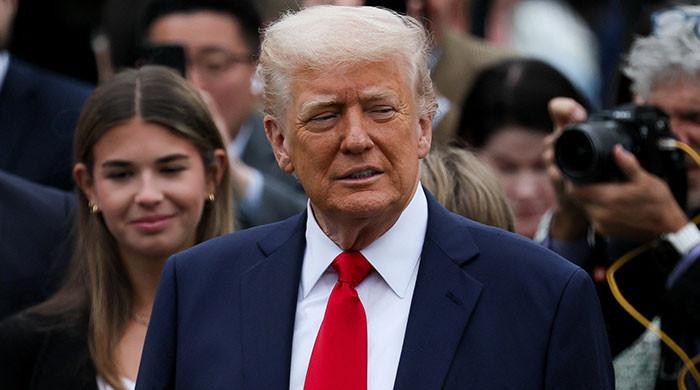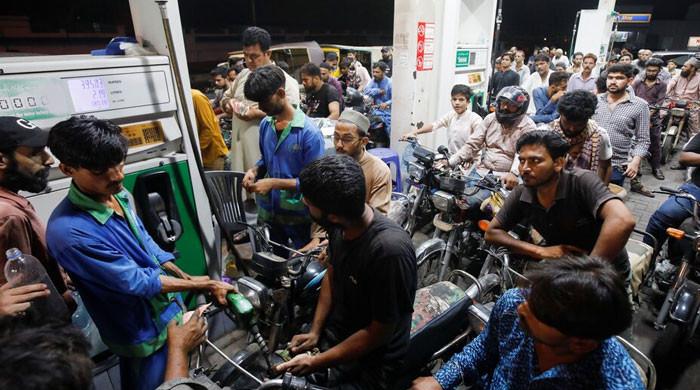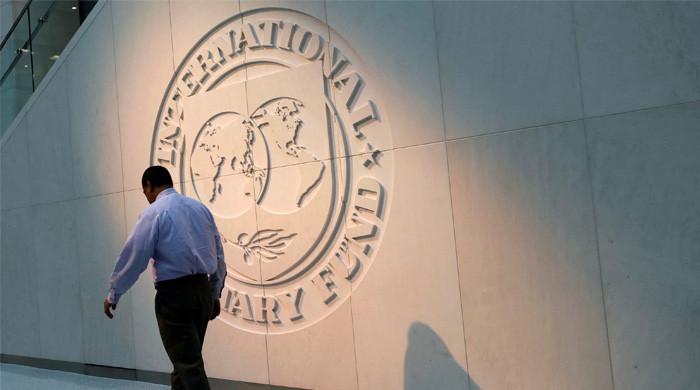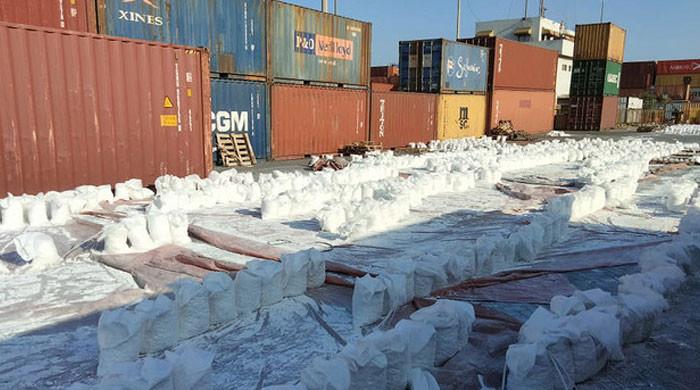Lawfare limited to warfare unlimited
To employ lawfare, states depend on some novel processes of legislation, apply them on vocal persons
March 30, 2025
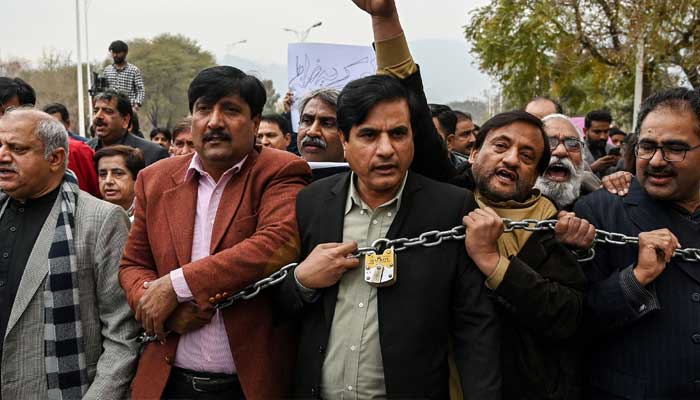
From the construction of canals in the Cholistan desert to the abduction of activists and journalists in cities and towns of Pakistan; and from attacks and baton charges on Baloch protesters in Karachi and Quetta to establishing a ‘hard state’, there appears to be a guise of legitimacy for all state actions.
South Asian states, whether Bangladesh, India or Pakistan — or any other state in the world for that matter including America, China or Russia — try to project themselves as active and legit players in the games they play. In terms of democratic and fundamental rights of the people, many state actions, decisions, and statements by bureaucrats — both civil and military — lack legitimacy.
This façade of being in authority and the guise of being ‘legal’ is nothing but an eyewash that needs debunking. It is a kind of ‘lawfare’ that makes strategic use of the law and appearance of being legal to hinder or intimidate an opponent.
Perhaps it is better to discuss the term ‘lawfare’ in some detail. When a country — government or state — uses the law against its perceived or real enemies, it indulges in lawfare. When certain state functionaries challenge the legality of protests — let’s say against the canals — they use lawfare.
When activists and journalists lose their freedom of expression at the hands of a state that uses dubious laws such as the Prevention of Electronic Crimes Act (Peca), it is an example of lawfare. To employ lawfare, states depend on some novel processes of legislation and apply them on vocal persons such as Mahrang and Sammi Baloch to Farhan Mallick and Waheed Murad.
Gradually, the use of lawfare emerges as an alternative to fighting elections, confirming the worst fears about derailing a democracy. Through lawfare — as a corollary to warfare — the states make use of legal systems and institutions to affect internal affairs and at times even foreign policy. They project this lawfare as a tool to maintain peace and even claim it to be a rational alternative to warfare. Despite such claims, it is seldom — nay never — a less benign adjunct to warfare. Ultimately it becomes an attempt to damage the detractors of the state, it delegitimises an individual’s usage of legal rights and deters upcoming voices.
Though lawfare pretends to use legal principles, it undermines the very system of economic and political justice that is already under stress. In Pakistan, the state has already wasted tremendous resources such as its own energies, its human potential, the money that actually belongs to the people of Pakistan, and of course the time that the state functionaries should have spent on healing and harmonising rather than intimidating and striving to make themselves even ‘harder’. Concepts such as ‘strategic depth’, ‘iron hand’, and ‘hard state’ have already cost this country and its people a lot.
Now in Pakistan, we are witnessing 'strategic lawsuits' that hamper public participation in open discussions and protests. All states sooner or later realise that winning a public relations victory is not a game of rhetoric or the use of inflexible and strong language.
Even if the facade is democratic, lawfare betrays the inner structure of a repressive regime. All this leads to a dispensation in which the state discourages civil society and deters individuals from claiming their legal rights via national or international legal systems. While civil society and concerned individuals use non-violent methods to highlight corruption and oppose discrimination, the state employs persecution through lawfare.
Limiting freedom of speech points to a lack of democracy with violations of human rights and violations of international humanitarian law. Since lawfare is the portmanteau of law plus warfare tracing its origins to the 1970s, the two concepts closely resemble and the definition itself becomes hard to justify as the legal system becomes contentious as has happened in Pakistan with laws such as the Maintenance of Public Order (MPO) and Peca; both have become handy in the highhandedness of the state in Pakistan.
The use of law as a weapon of warfare against the citizens is neither justifiable nor legal in the true spirit of the law which is to protect the people against the strong-arm tactics of the state. In Pakistan, we have been experiencing a situation in which lawfare has evolved into a method of warfare where the law becomes a means of realising a military objective in the name of security while the people of Pakistan are increasingly becoming even more insecure by the day. The country is a witness to the exploitation of mostly orchestrated and perceived incidents of violations that are seldom real.
The state employs such violations as an unconventional means of confronting dissent or demands for rights. Though some security experts tout lawfare as a more humane substitute for military actions, more often than not it results in gross manipulation of rule of law; Pakistan is becoming an example of a state where humanitarian values become less significant for both non-state and state actors. Rule of law — if there is any — it must represent and respect fundamental humanitarian values without which there remains only a thin line between lawfare and warfare.
Be it Farhan, Mahrang, Sammi, Waheed, or the protesters against the new canals and those who demand recovery of the missing persons, all deserve a fair trial and no unfair use of MPO and Peca can justify the brutal treatment that these individuals have faced. Just by focusing on national security and without any debates and discussions, both lawfare and warfare have not produced any results and it is unlikely in future too. Adversarial uses of legal systems by non-state and state actors lead to what some sane people call ‘paper terrorism’.
The way the state of Pakistan has been using lawfare is tantamount to turning the law against its own people by prosecuting the protesters and seizing the dissenters. By doing this, the state ends up undermining its own authority and clogs up administrative and judicial processes. There are many in Pakistan that the state has tried to bury under a deluge of legal cases. Many of the accused and even their lawyers don’t know they are in a case of lawfare as the state — acting through its functionaries and lawyers — files injunctions and lawsuits against activists, journalists, and even intellectuals and researchers.
Primarily, in lawfare there is an intention to suppress what you are saying and to deter all dissenters. When a state engages in lawfare it charges dissenters, protesters, and opponents with violations of law and stops them from rightfully claiming their rights. Soon, limited lawfare morphs into unlimited warfare, if it has already not done so. The states also tend to use the notion of lawfare to attack lawyers who file habeas petitions on behalf of alleged dissenters or violators of laws that lack legitimacy in terms of democratic and fundamental rights.
Lawfare has also predominantly taken two interrelated forms in the shape of ‘instrumental’ lawfare which is the instrumental use of legal tools to achieve the same or similar effects as those the state traditionally seeks from military action. The second is compliance and disparity lawfare which the state designs to gain advantage from the influence that law and its processes exert over a perceived or real adversary. As in Pakistan lawfare’s impact and prevalence are increasing, the situation is turning murkier. As the cost of military operations is increasing and information technology is undergoing a revolution, there is a renewed attack on civil society and dissenting voices in the country.
Lawfare is like a legal encirclement that the state in Pakistan must avoid and refrain from targeting activists, dissenters, journalists, and protesters. Imaan Mazari and Hadi Ali Chattha have emerged as a potent voice against lawfare in Pakistan.
The writer holds a PhD from the University of Birmingham, UK. He tweets/posts @NaazirMahmood and can be reached at: [email protected]
Disclaimer: The viewpoints expressed in this piece are the writer's own and don't necessarily reflect Geo.tv's editorial policy.
Originally published in The News






